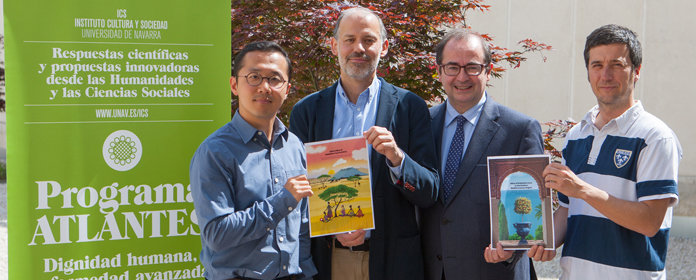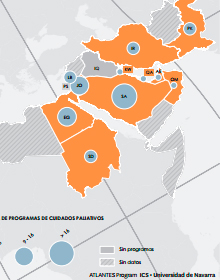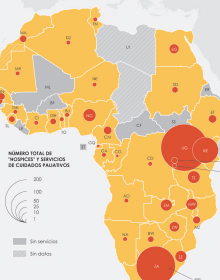The state of palliative care in Africa and Arab countries of the Eastern Mediterranean have been analyzed, for this first time, in two publications
Promoted by the Institute for Culture and Society of the University of Navarra, with data collected from 48 African countries and 15 Mediterranean countries

FOTO: Manuel Castells
Two new publications analyze and present the current state of palliative care in Africa and Arab countries of the Eastern Mediterranean region. In total, 48 African countries and 15 Eastern Mediterranean countries were studied. The publications were completed with the guidance and expertise from the ATLANTES Program at the Institute for Culture and Society (ICS) of the University of Navarra.
“The current state of palliative care in Africa has not been updated in the last 10 years and such a study has never been done in the Eastern Mediterranean,” says Carlos Centeno, Principal Investigator of the ATLANTES Program and Director of the Palliative Medicine Unit at the University of Navarra Hospital.
The African Atlas shows that the total number of palliative care services on the African continent is lower than that of the United Kingdom, even though the population of Africa is ten times greater than that of the United Kingdom. 19% of the African countries analyzed have no identified services and 71% of those services are concentrated in Uganda, South Africa, and Kenya.
In the Eastern Mediterranean region, the total number of palliative care services in the 15 countries analyzed make up just over one-third of the total number of services in Spain, despite the fact that the region’s population is twelve times greater than that of Spain. In addition, almost half of the identified services in the region are in Saudi Arabia, although there have been significant developments in Lebanon and Jordan. There are still countries with no - or almost no - specialized palliative care services.
Limited use of medicines to combat painA striking fact in both Atlases is that in Africa and in the Eastern Mediterranean region, patients die in pain because of the limited use of medicines to combat pain. In Africa, only 1 milligram of opioids is consumed per capita per year and in the Eastern Mediterranean region, only 4.5 milligrams per capita per year. This is in comparison with consumption in Europe, where the average consumption is 120 milligrams per person per year.
In terms of the development of palliative care in Africa, it is noteworthy that palliative care has grown from the work and dedication of local pioneers, almost always initiated outside the weak healthcare infrastructure.
Dr. Carlos Centeno, researcher at the ICS of the University of Navarra, points out that on the continent, “One could say that the essential palliative care healthcare professional is the nurse, who often offers not only physical care, but also support and counseling in cases of anxiety and depression as well as spiritual support and counseling, where necessary.” He adds that, “Community is at the heart of African culture,” and this, together with the need to collaborate with other professionals, has led to the development of a unique healthcare profession, community health workers.
“They have basic healthcare training and help the nursing professionals as liaisons. They are in direct contact with those who care for the sick, helping with the supply of medicines, reporting changes in the condition of patients, and assisting in specific tasks such as cleaning the patient or room and cooking food.” Dr. Centeno emphasizes that they often perform these tasks voluntarily, without receiving a salary or in exchange means for transportation to stay in communication with the palliative care team, such as a bicycle or motorcycle.
Funding for HIV/AIDS has also been a major contributor to palliative care growth in Africa. Palliative care became a key part of the care of HIV/AIDS in many countries, given the limited treatment options and high patient mortality. However, with the decline in HIV/AIDS funding, palliative care funding has also been reduced, and many programs are at-risk.
In the case of the Eastern Mediterranean, palliative care began as a medical service mainly for cancer patients, often arising from preexisting pain units. At present, palliative care services do not include conditions outside of cancer.
The palliative care services in this region are mostly in hospital facilities, either as external consultations or as hospital support teams that offer consultations to other specialists. There are also, to a lesser extent, home care teams and a few care centers.
Dr. Centeno is hopeful about the future. “Little by little, doctors and nurses in these regions are receiving training in palliative care. Universities also recognized the need to provide this care. Half of the African countries and one-third of the Eastern Mediterranean countries have at least one university where palliative care is taught.”
Identifying strenghts and areas for improvementBoth publications, which were made possible with the financial support from Santander Bank, add to the collection of Atlases that analyze the state of palliative care in different regions of the world, with support from the University of Navarra. In 2012, the European Atlas was published, and in 2013, the Latin American Atlas.
Dr. Centeno emphasizes that, “Governments and organizations, such as WHO, need these Atlases and other data to make and/or guide decisions. These studies demonstrate similarities and differences with other regions. They also serve to identify strengths or identify the areas -medicines, education, policies- for improvement in each country.”
The African Atlas is a joint project with the African Palliative Care Association (APCA), the Arnhold Institute for Global Health at the Icahn School of Medicine of Mount Sinai in New York, the International Association for Hospice and Palliative Care (IAHPC), and the ATLANTES Program at the University of Navarra.
The Atlas of the Eastern Mediterranean Region is a joint project with the Lebanese Center for Palliative Care-Balsam and the ATLANTES Program at the University of Navarra with support from the World Health Organization (WHO) and the International Association for Hospice and Palliative Care (IAHPC).






